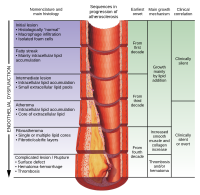
Photo from wikipedia
ABSTRACT Introduction Recommended therapy for calcific degenerative aortic stenosis (AS) is still aortic valve replacement (AVR), either transcatheter or surgical, since no conclusive efficacy has been determined in slowing the… Click to show full abstract
ABSTRACT Introduction Recommended therapy for calcific degenerative aortic stenosis (AS) is still aortic valve replacement (AVR), either transcatheter or surgical, since no conclusive efficacy has been determined in slowing the degenerative process by medical therapy. Areas covered This paper offers a brief overview of molecular mechanisms leading to calcification of aortic valve. It is then focused on potential markers of disease progression, as observed in many observational studies. Finally it provides a comprehensive review of drugs already tested in in vitro and human studies in order to slow aortic valve stenosis process. Expert opinion Despite research providing numerous molecular pathways underlying the calcification process, further efforts must be made to understand risk factors linked to disease progression. Some existing treatments that have already provided survival benefits in many features of cardiovascular diseases are currently being tested with promising results. In the near future new drugs acting on specific pathways by techniques such as monoclonal antibodies and RNA interference, are expected to provide better medical solutions for this ever growing number of patients.
Journal Title: Expert Opinion on Therapeutic Targets
Year Published: 2022
Link to full text (if available)
Share on Social Media: Sign Up to like & get
recommendations!